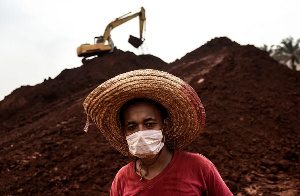 A new report details how aluminum production destroys farmlands, pollute waterways
A new report details how aluminum production destroys farmlands, pollute waterways
Rights groups have called on car manufacturers to do more to address abuses in their aluminum supply chains, including the destruction of farmland, damage to water sources and excessive greenhouse gas emissions that affect communities in Africa, Asia and South America.
On Thursday, Human Rights Watch (HRW), along with Inclusive Development International (IDI), released a 63-page report detailing the fallout from aluminum production particularly related to mining and refinement of the raw material bauxite in countries including Guinea, Ghana, Brazil, China, Malaysia and Australia.
“Car manufacturers see aluminum as a critical material for the transition to fuel-efficient vehicles,” said Jim Wormington, senior Africa researcher at HRW. “They should use their ever-increasing purchasing power to protect the communities whose land and environments are harmed by the aluminum industry.”
While the world’s leading automakers “have publicly committed to addressing human rights abuses in their supply chains, they have done little to evaluate and address the human rights impact of aluminum production”, HRW said in a statement.
Instead, amid a surge in global production and awareness, the manufacturers have put more emphasis on addressing abuses committed in supply chains of other raw materials used for electric vehicles, notably cobalt, according to the report, which was partially based on correspondences with nine big car companies: BMW, Daimler, Ford, General Motors, Groupe PSA (now part of Stellantis), Renault, Toyota, Volkswagen and Volvo.
Three other companies – BYD, Hyundai, and Tesla did not respond to requests to participate in the studies.
Car companies used a fifth of all aluminum consumed worldwide in 2019 and are forecast to double their consumption by 2050, the report said.
Farmland destruction, waterway pollution
The report underscores how several processes related to aluminum production have dire consequences on local communities.
Bauxite, a red ore, involves “surface level mining”, which can destroy large swaths of farmland.
In Guinea, which has the world’s largest bauxite deposits, a government study in 2019 projected that over the next 20 years, bauxite mining would remove about 858 square kilometers (331 square miles) of agricultural land, destroying some 4,700sq km (1,814sq miles) of natural habitat, according to the statement.
Meanwhile, refining bauxite into alumina, a step towards creating aluminum, creates large amounts of hazardous “red mud” that can pollute waterways.
A group in Brazil’s Para state is currently suing a bauxite mine, a refinery and an aluminum smelter over the alleged contamination of waterways in the Amazon basin.
The report also highlighted the energy-intensive process of smelting aluminum, noting that China, a leading aluminum smelting country, produced 90 percent of its aluminum through coal power in 2018.
Overall, aluminum production is responsible for about 2 percent of global greenhouse gas emissions, it said.
While three German car manufacturers – Audi, BMW, and Daimler – have encouraged their suppliers to join an industry-led certification program, Aluminum Stewardship Initiative (ASI), the rights groups said the program lacks “adequate detail and do not provide specific criteria to assess how well companies respond to key human rights issues”.
The report’s authors noted that some car companies have taken further steps to address problems in the aluminum supply chain since being contacted by the rights groups.
In May, Drive Sustainability, a grouping of 11 car companies, including BMW, Daimler, Ford, Toyota, Volkswagen and Volvo, launched an initiative to assess human rights risks in the production of aluminum and nine other raw materials.
In a statement, Natalie Bugalski, the legal and policy director at Inclusive Development International, said the steps should be just the beginning of a “wider effort by the car industry to address the human rights impact of aluminum production”.